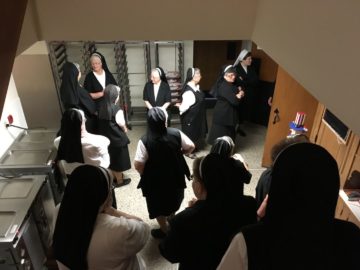Looking for a Gospel reflection and questions written for the Fourteenth Sunday of Ordinary Time? Fr. Paul Gallagher, OFM writes with a Franciscan perspective for your prayer. They are edited by Franciscan Sister of Christian Charity Sister Anne Marie Lom and Joe Thiel. The excerpts from the Sunday readings are prepared by Joe Thiel. To read or download the complete pdf with excerpts for your prayer, please click here: Franciscan Gospel Reflections July 5 Excerpts are from the Lectionary for Mass for Use in the Dioceses of the United States of America, second typical edition © 2001, 1998, 1997, 1986, 1970 Confraternity of Christian Doctrine, Inc., Washington, DC. Used with permission. All rights reserved. No portion of this text may be reproduced by any means without permission in writing from the copyright owner. (Photos: before covid19 Holy Family Convent)
Matthew 11:25-30
At that time Jesus said in reply, “I give praise to you, Father, Lord of heaven and earth, for although you have hidden these things from the wise and the learned you have revealed them to the childlike. Yes, Father, such has been your gracious will. All things have been handed over to me by my Father. No one knows the Son except the Father, and no one knows the Father except the Son and anyone to whom the Son wishes to reveal him.
“Come to me, all you who labor and are burdened, and I will give you rest. Take my yoke upon you and learn from me, for I am meek and humble of heart; and you will find rest for yourselves. For my yoke is easy, and my burden light.”
Background:
The first part of this text, verses 25-27, is also found in Luke’s gospel. (Luke 10:21-22) Therefore scholars believe that it comes from an earlier source that both Luke and Matthew used as they composed their gospels. The style of the text is different from what is found in most of the synoptic gospels. It is like more prayerful texts found in John’s gospel. The second part of this text is unique to Matthew.
In Jesus’ day, the rich would become “patrons” of others who were not members of their family. The patron would treat these clients as if they were members of the family. In some cases, the “patron” would use an agent who would act on their behalf to arrange the relationship. Their relationship benefited both the patron and the client. The client received the benefits of being included in the patron’s family, and the patron received the esteem of the community. The client was expected to make the generosity of the patron known. In Jesus’ culture, esteem and honor were so important that it was considered foolish not to become a patron if one had the wealth that would enable him to do so. That is the point of the parable that Jesus tells of the foolish landowner who had the wealth, but instead of taking on clients, decided to build larger barns so he could store up his wealth and not have to work. (Luke 12:16-20)
Looking at this gospel through the patron/client cultural lens, God the Father is the patron, those who are burdened are the clients, and Jesus is described as the broker/agent for the Father. In the first verse of this gospel text, God is described as “Father, Lord of heaven and earth.” The Father is being described as one who is responsible for bringing all of creation into existence. Verses 26 and 27 describe Jesus as the One the Father has chosen to act as His agent. The Father has sent Jesus to those who “labor and are burdened.” They are invited to take a yoke that is easy and a burden that is light. It is an invitation to a relationship with God, the creator of the universe, who desires to make them part of God’s family and not a slave of some earthly master.
Reflection Questions:
- Take some time to make two lists, side by side. On one, list the qualities of the wise and clever, and on the other, list the qualities of the childlike. Do you recall moments in your life when the qualities of one side or the other came to the fore?
- Jesus describes his relationship with the Father as intimate and exclusive. How you respond to this description?
- What are the burdens of your life?
- How would you describe your personal prayer?
- What happens within you when you praise God?
- Jesus talks about God as having “hidden these things from the wise and the learned,” yet revealing them to “the childlike.” How do you find yourself responding?
- In the gospel, Jesus invites everyone to come to him and take on his yoke. How do you find yourself responding to his invitation?
- In the gospel, Jesus talks about God’s relationship from different perspectives. Can you take time to talk with God about that part of this gospel that invites you into a deeper relationship with God, yourself, and others?





Article Comments:
Sister Anne Marie Lom 07/05/2020 @ 6:37 am
#3 The burdens of my life are the daily chalenges to be humble, conscious of being in God’s Prence, and moment by moment turning to the Lord. I
These are “easy burdens” when I allow the Lord to transform me in each circumstance of the day!